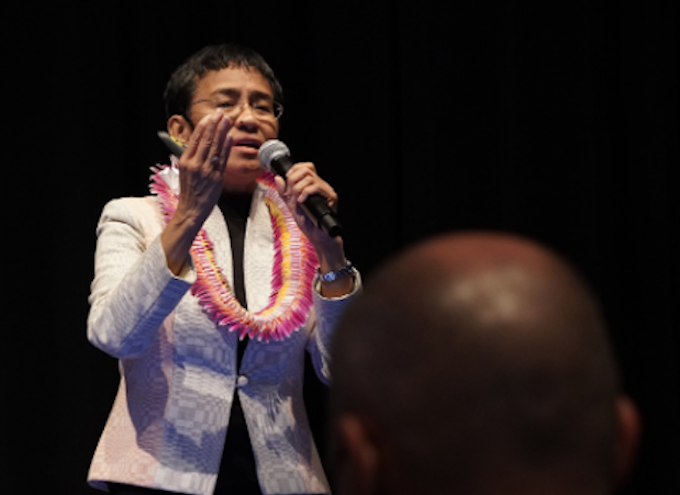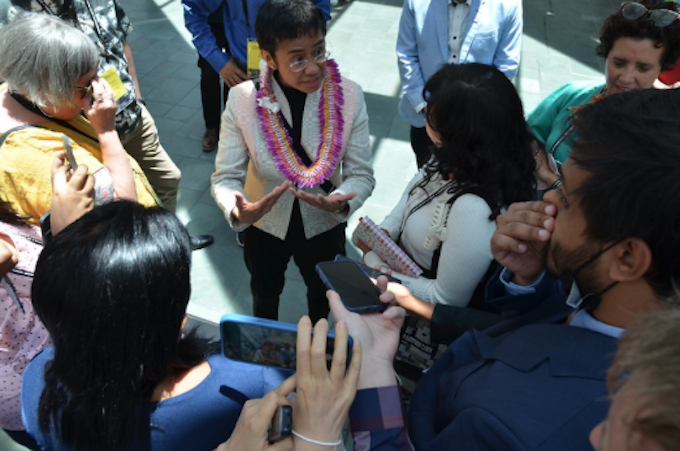
Nobel Peace Prize laureate and press freedom champion Maria Ressa wasn’t intending to make breaking news when she planned her keynote address at the East-West Center’s 2022 International Media Conference in Honolulu this week.
But late the night before she got disturbing word from her lawyers that the Philippines government’s Securities and Exchange Commission (SEC) had issued an order for her online news organisation Rappler to shut down.
“You are the first to hear this,” Ressa said, as she told the combined in-person and online audiences of around 450 international journalists and media professionals gathered for the conference about the commission’s order.
Under now-former President Rodrigo Duterte, Ressa and Rappler have faced multiple charges, widely believed to be retaliation for her critical reporting on Duterte’s deadly drug war and abuses of power.
Ressa vowed to continue fighting the commission’s order, even as new President Ferdinand Marcos Jr — son of the late Philippines dictator who was forced to flee the country in 1986 — prepared to be sworn into office yesterday.
In the meantime, she said, “It is business as usual for Rappler. We will adapt, adjust, survive, and thrive. As usual, we will hold power to account. We will tell the truth.”
Safeguarding freedom of expression
Ressa’s struggle to thwart the government’s efforts to shut down her groundbreaking news outlet and imprison her for cyber-libel led to Ressa becoming the first Filipino recipient of the Nobel Peace Prize for her “efforts to safeguard freedom of expression, which is a precondition for democracy and lasting peace,” as the Nobel Committee put it.
In her address to the media conference, Ressa bemoaned the fact that the global environment for quality journalism has deteriorated so quickly, in part because at least initially there was a reluctance to accept just how much damage the online world can do to the real one.
“Online violence is real-world violence,” she said. “They’re not separate. Digital impunity is real-world impunity.
“There is only one world that we live in, and for the platforms and legislators to think that these are two systems has weakened the rule of law in the real world.”
After being brutally attacked online by Duterte backers, Ressa has campaigned tirelessly against what she called a “tyranny of trends.” Through their algorithms, social media platforms have created a new information ecosystem that prioritises “lies laced with anger and hate” over “boring” facts, she said.
“These platforms are determining the future of news, and yet their driver is profit, right? The platform’s profit — not the public’s, not journalism’s.”
That system has made it more difficult for humans to listen to their better angels, Ressa said, because “social media gave the devil a megaphone. And this is why we are seeing the worst of human nature.”
The problem, she said, is that the forces of manipulation do not need to convince the public of anything. They only need to sow doubt and uncertainty in order to create distrust of the facts.

Pillars of trust
Ressa said Rappler was built on a foundation of three pillars to rebuild trust in the news media: technology, journalism and community.
“Tech has to be first because this was the spark that ignited the world, and not for good,” she explained.
“Journalism, because we must continue independent journalism despite what it costs us, and we must let our societies know that. And finally community, because journalists can’t do this alone.”
The importance of maintaining independent journalism outlets is intensified by the fact that this year there are more than 30 elections globally, according to Ressa: “I said this in the Nobel lecture: If you don’t have integrity of facts, how can you have integrity of elections? You can’t, and that’s the problem.”
The consequences can be catastrophic, she said. “When real people who are insidiously manipulated online then democratically elect an illiberal leader and the balance of power of the world shifts, how much more time do we have before we move into a fascist world?”
Banding together against disinformation
Ressa counsels independent journalists around the world to build their courage, commitment and, most importantly, community, saying the only way to stand up to the forces of disinformation is to join hands.
Before the recent elections in the Philippines, for example, 16 news organisations agreed to collaborate on fact-checking campaign statements.
“We shared each with other,” Ressa said. “We made the content agnostic. We’re not competing against each other; we’re competing against evil and lies.”
That experience helped inform Ressa’s vision of a world in which trust in facts and institutions can be rebuilt on four levels. The first and most basic is independent journalism as exemplified by news organisations like hers.
The second she calls “the mesh”, elements of civil society that can take the facts news outlets and share them with emotion and inspiration.
The third level is academic research designed to help better understand the societal challenges, which continue to evolve. The final level is a proactive legal approach in which lawyers engage in both tactical and strategic litigation, rather than simply waiting to defend against the latest attacks.
Still, Ressa admitted that she is extremely worried about the future of objective journalism and the societies that rely on it.
The world does have the resources to fight back, she but not as individuals: “We really must work together,” she concluded. “And a global coalition is the best way to do this.”













































